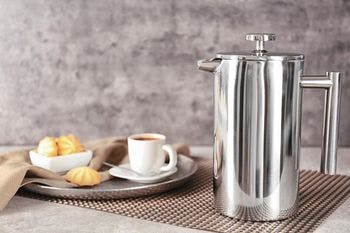
Stainless Steel vs Glass French Press: Which is Better?

The world of coffee is a beautiful, mysterious place filled with rich aromas, complex flavors, and fascinating brewing techniques. And at the heart of it lies the French press, the humble tool that can transform a simple cup of joe into a work of art.
But when it comes to choosing between a stainless steel or glass French press, things can get heated - like the water you pour into your press.
Some swear by stainless steel, claiming it's more durable and retains heat better. Others prefer glass, arguing that it allows for better control over the brewing process and doesn't leave a metallic taste in the coffee.
But how do you decide between a stainless steel and a glass French press? In this blog, we'll explore the advantages and disadvantages of each and help you make an informed decision.
Stainless steel French press: Overview
A stainless steel French press is a popular option among coffee enthusiasts. It is incredibly durable and can withstand accidental bumps and drops, making it a perfect option for those who handle their kitchen appliances roughly.
The double-walled construction of a stainless steel French press helps retain heat, keeping your coffee hot for longer. This means that you can enjoy your coffee at your own pace without worrying about it getting cold.
Additionally, stainless steel is easy to clean, making it a great option for those who want a low-maintenance coffee maker.
What are the advantages of stainless steel French Press?
- Durable and long-lasting
- Retains heat well, keeping coffee warm for longer
- Easy to clean and maintain
- Resistant to rust and corrosion
- Sleek and modern design
- Ideal for outdoor and travel use due to its sturdiness
What are the disadvantages of stainless steel French Press?
- Heavier and bulkier than a glass French press
- More expensive than a glass French press
- Potential metallic taste impact on coffee
- Requires a longer brewing time due to its thicker insulation
Get the right stainless steel French press from HERE.
Glass French press: Overview
Glass French press is a classic and elegant coffee maker that has been in use for decades. It is made of high-quality glass that is heat-resistant and can withstand high temperatures.
It is known for its ability to showcase the color and texture of the coffee, making it an aesthetically pleasing choice. Glass French presses are also relatively easy to clean. Most French press models are dishwasher safe, but you can also clean them by hand with some soap and warm water.
What are the advantages of the Glass French Press?
- Classic and elegant design
- Aesthetically pleasing and visually appealing
- Affordable option
- Lightweight and easy to use
- Does not alter the taste of coffee
- Ideal for showcasing the color and texture of coffee
What are the disadvantages of Glass French Press?
- Fragile and prone to breaking
- Does not retain heat as well as stainless steel French presses
- Requires extra care when cleaning and maintaining
- Difficult to clean and prone to staining
- Limited size options compared to stainless steel French presses
Get the right glass French Press from HERE.
Glass vs. stainless steel French press: Quick comparison
One of the major differences between stainless steel and a glass French press is that the stainless steel French press is made of durable, heat-retaining stainless steel, known for its sturdiness and longevity. It offers excellent heat retention, keeping your coffee hot for an extended period. On the other hand, a glass French Press is constructed from heat-resistant borosilicate glass, appreciated for its transparency and neutrality in taste. It allows you to watch the coffee as it brews which offers a visually engaging experience.
Let's compare both of them based on other factors.
1) Durability
Stainless steel French presses are more durable than glass French presses.
2) Taste impact
Glass French presses do not impart any taste to coffee, while stainless steel may impact the taste slightly.
3) Heat retention
Stainless steel French presses retain heat better than glass French presses.
4) Size
Glass French presses are generally available in smaller sizes than stainless steel French presses.
5) Price
Glass French presses are generally more affordable than stainless steel French presses.
6) Filtration
Both stainless steel and glass French presses have excellent filtration.
7) Cleaning
Stainless steel French presses are easier to clean than glass French presses.
Consider these factors while purchasing stainless steel or glass French press
Before purchasing a French press, consider the following factors:
- Personal preferences: Decide which factors are most important to you, such as taste, durability, and aesthetics.
- Frequency of use: If you plan to use your French press frequently, choose a durable option that can withstand regular use.
- Cleaning: If you want a French press that is easy to clean, a stainless steel French press may be a better option.
- Maintenance requirements: Consider the maintenance requirements of each type of French press. Stainless steel may require less maintenance, while glass may require more care.
- Budget: Determine your budget and choose a French press that fits within your price range.
Stainless steel or glass French press: The final verdict
There is no clear winner when it comes to choosing between a stainless steel and a glass French press. Both have their advantages and disadvantages.
If you're looking for durability, heat retention, and ease of cleaning, a stainless steel French press is an excellent choice. However, if you prefer a cleaner taste, affordability, and better filtration, go for a glass French press.
Ultimately, it comes down to personal preference and what matters most to you as a coffee lover. Consider your needs, budget, and preferences before making your decision. Whichever option you choose, make sure you take good care of it and enjoy your delicious, freshly brewed coffee every day! Happy brewing!

I am a barista by profession hailing from NC. My journey began in my late teens when I started working as a barista in a local coffee shop. My passion for coffee quickly became evident as I immersed myself in the art of espresso extraction, latte art ...



